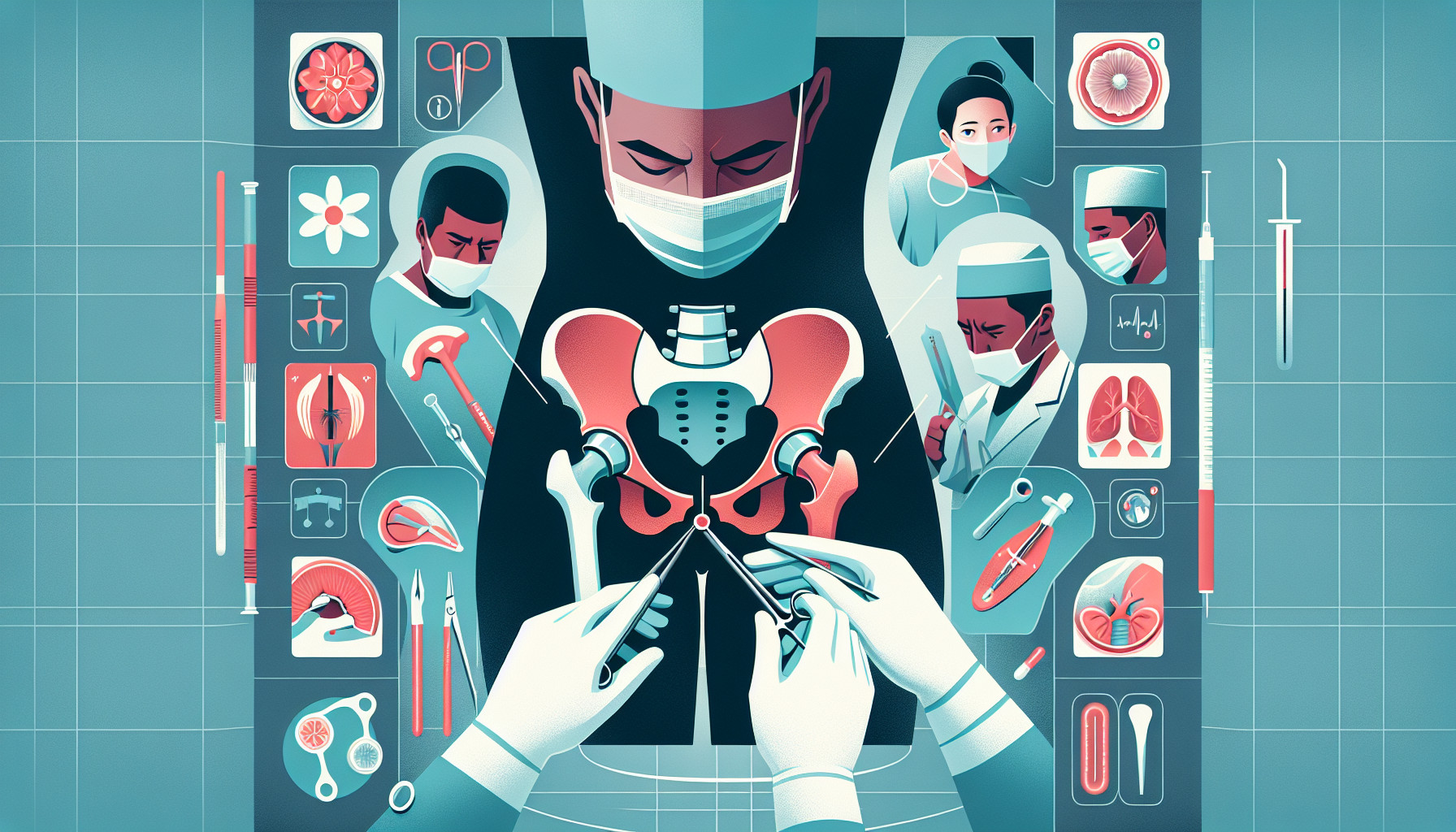Our Summary
This study looks at the increasing incidence of total hip replacement surgeries in Cameroon. This increase is due to more medical practitioners being available, better access to needed medical supplies, and improved surgical skills. However, there are still challenges with the surgery environment, the availability of equipment, the cost, and cultural beliefs about traditional medicine.
The study focused on surgeries performed in the Far North region of Cameroon at the Maroua Military Hospital. Over six years, 168 surgeries were performed on 158 patients. A single surgeon did all of the surgeries using a specific type of approach. Information was collected about the patients’ backgrounds, their medical history, and details about the surgery.
The patients were followed up with for an average of 16 months after their surgeries to see how they were doing. The study found that most patients were men, had low to moderate incomes, and paid for their surgeries in two or three payments. The main reasons for needing surgery were untreated injuries and a specific type of bone disease, often made worse by the use of traditional medicine.
During surgery, there were complications in 8% of cases, mainly nerve damage. After surgery, 8.8% of patients had infections. However, at the end of the follow-up period, 65% of patients had good or excellent results.
The study suggests that improving the technical infrastructure and introducing payment plans could improve results and lower the rate of complications.
FAQs
- What are the main reasons for the increase in total hip replacement surgeries in Cameroon?
- What were the main reasons for patients needing hip replacement surgeries according to the study?
- What measures does the study suggest to improve the results and lower the rate of complications in hip replacement surgeries?
Doctor’s Tip
One important tip a doctor might give to a patient about hip replacement surgery is to follow all pre-operative instructions carefully. This may include stopping certain medications, preparing your home for recovery, and practicing exercises to strengthen the muscles around your hip. By following these instructions, you can help ensure a successful surgery and a smooth recovery process.
Suitable For
Patients who are typically recommended for hip replacement surgery are those who are experiencing severe hip pain and stiffness that limits their daily activities, have not found relief from conservative treatments such as medication or physical therapy, and have been diagnosed with conditions such as osteoarthritis, rheumatoid arthritis, avascular necrosis, or hip fractures. In some cases, younger patients with hip conditions such as dysplasia or hip impingement may also be candidates for hip replacement surgery.
Timeline
Before hip replacement:
- Patient experiences hip pain and stiffness that affects their daily activities.
- Patient consults with their doctor and is referred to an orthopedic surgeon for evaluation.
- Orthopedic surgeon conducts physical exams, imaging tests, and medical history review to determine if hip replacement surgery is necessary.
- Patient undergoes preoperative evaluations, such as blood tests, ECG, and other tests to ensure they are fit for surgery.
- Patient receives information about the surgery, including risks, benefits, and recovery process.
After hip replacement:
- Patient undergoes hip replacement surgery, which involves replacing the damaged hip joint with an artificial implant.
- Patient is monitored in the hospital for a few days post-surgery to manage pain, prevent infection, and begin physical therapy.
- Patient is discharged from the hospital and continues physical therapy and rehabilitation at home or in a rehabilitation facility.
- Patient gradually resumes daily activities and follows up with their doctor for postoperative check-ups.
- Patient experiences improved mobility, reduced pain, and better quality of life as they recover from hip replacement surgery.
What to Ask Your Doctor
Some questions a patient should ask their doctor about hip replacement surgery include:
- What are the potential risks and complications associated with hip replacement surgery?
- What type of approach will be used for my surgery, and why is it recommended for me?
- How long is the recovery process, and what can I expect in terms of pain management and rehabilitation?
- What type of anesthesia will be used during the surgery, and how will it affect me?
- What are the expected outcomes of the surgery, and what level of activity can I expect to regain after recovery?
- How long will the artificial hip joint last, and what follow-up care will be needed in the future?
- Are there any specific lifestyle changes or precautions I should take after the surgery to ensure a successful outcome?
- What are the costs associated with the surgery, and are there any payment plans or financial assistance options available?
- How experienced is the surgical team performing the procedure, and what is their success rate with hip replacement surgeries?
- Are there any alternative treatments or therapies that could be considered before resorting to hip replacement surgery?
Reference
Authors: Bessala BT, Mayopa CD, Kolontchang L, Fodjeu G, Umaru C, Mbuku RB, Biongolo F, Eone DH, Bahebeck J. Journal: Pan Afr Med J. 2025 Mar 6;50:66. doi: 10.11604/pamj.2025.50.66.46467. eCollection 2025. PMID: 40486003
